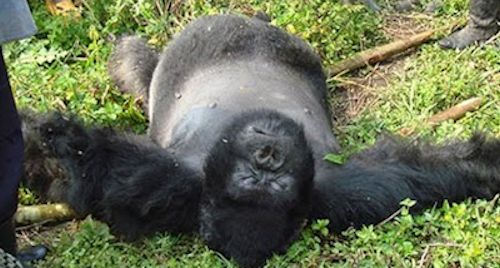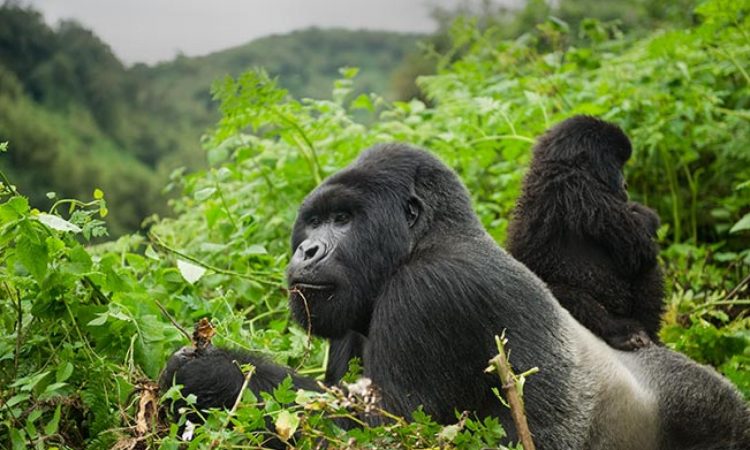Gorilla poaching in Rwanda
Gorilla poaching in Rwanda is now more of a history or a memory but is not fully ruled out as there as still some poachers out there and other push factors for this illegal act. Poaching of the mountain gorillas or any wild animal is an illegal act punishable by a hefty fine or even lifetime imprisonment. The animals that are considered to have a high value or have a body part that is valuable in the market are the biggest prey to the poachers.

The mountain gorillas are an endangered animal species that is associated with a number of values thus being a target to poaching. The mountain gorillas were in the past an easy target for this gruesome practice as they were living in the world with no protection from the several conservation bodies recently.
The conservation of mountain gorillas in Rwanda can be highly attributed to the female American zoologist and anthropologist Dian Fossey who picked interest in these gentle giants in 1966 and advocated for the end of poaching and rather conservation of the mountain gorillas of Rwanda. The mountain gorillas of Rwanda can be found in the Volcanoes national park located in the North western part of the country.
Rwanda is one of the homes of the mountain gorillas and these endangered animal species can only be visited or even found in only two places in the entire world and this is the Albertine rift where the Volcanoes national park of Rwanda, the Mgahinga gorilla national park of Uganda and the Virunga national park of the Democratic republic of Congo lie. The second place is the Bwindi impenetrable forest national park of Uganda.
Dian Fossey set up a base in the Volcanoes national park to focus fully on the mountain gorillas of Rwanda and also advocate more for the conservation and this is why she is spoken of in high regard in the area recently. The methods that the one Dian Fossey used to ensure conservation were somehow unethical tactics and may have ticked off some of the poachers.
Dian Fossey after a while founded the Karisoke Research Center in 1967 which is still standing up to date today to strategize in the conservation of the mountain gorillas. The Karisoke Research center is still among the leading research institutes in the world majoring in the studying and the conservation of the mountain gorillas.
Poaching of gorillas in Rwanda, the Volcanoes national park in particular was backed by a number of reasons and mainly selfish interests of the poachers and a few of these have been listed below. There are four major reasons of poaching the gorillas in Rwanda but the positivity is the decline in poaching cases with the recent times.
Source of bush meat
The poachers of Rwanda hunted the mountain gorillas down as they fed and sold the gorilla meat on the black market for consumption. The sale of mountain gorilla meat was a very profitable business as people paid heavily for a taste of it. The communities living around the park could easily access these animals and were living in poverty thus the hustle.
The gorilla meat was also said to be very tasty and it had sure market so mountain gorillas were hunted down, killed and sold. Sometimes the gorillas would unintentionally fall prey of the snares left for the other animals and they would be left lifeless and the poachers would finish them off and sell their meat.

Traditional practices
The poachers were often associated with the traditional methods of healing or acquiring wealth or strength. The mountain gorillas were associated with being strong animals and it would require 4 adult males to wrestle down one mountain gorilla. The body parts of the mountain gorillas were also used in witchcraft practices like the ears, tongues, testicles and the fingers of the silver back gorillas.
These traditional practices and black magic were a common thing in the area and is one of the reasons as to why the mountain gorillas of Rwanda were poached.
Exotification
The mountain gorillas were also abducted with an aim of being kept in captivity. There were some zoos that bought the mountain gorillas to showcase them in zoos all over the world and yet the mountain gorillas can not thrive in captivity. Once the mountain gorillas were taken to a zoo and started to get weak, they would be taken back to the wild in hope of being resuscitated but this was eventually impossible and they would die.
The zoos were usually a replica of the wild but could not fully provide the wild nature state in terms of climate and plant life. The gorillas of Rwanda were a few of those that were a target from the zoos in North America, Europe and Asia.
Prestige and souvenir
Just like in the old times, killing of a strong animal or an animal that was considered a big deal would commend you respect, those who killed the mountain gorillas and kept a souvenir to show their act of strength were honored. This was a common hunting experience in the Volcanoes national park.
There are other reasons as to why poaching of the gorillas in Rwanda was done but not as common in Rwanda and these include rebel groups killing of the gorillas during conflicts or resource extraction which was common in the Democratic republic of Congo. Conservation of gorillas is now a common practice and even you as an individual can take part in this on your Rwanda safari by booking a mountain gorilla trekking permit as a percentage per permit is put back into conservation. Book your mountain gorilla trekking experience in Rwanda with us, we await to hear from you.


